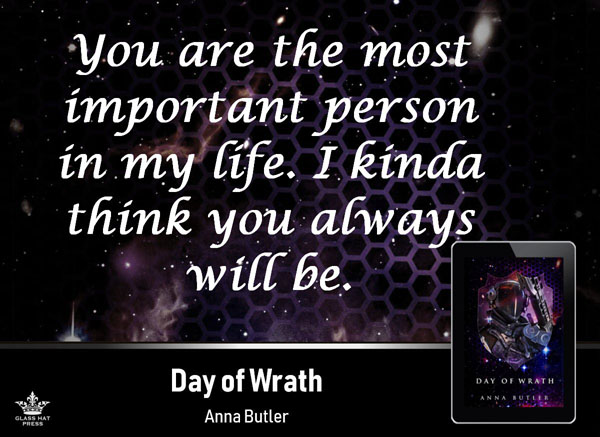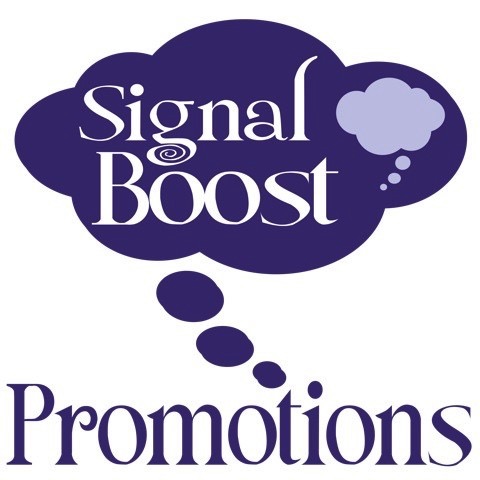QSFer Anna Butler has a new MM sci fi book out, the final one in her Taking Shield series: Day of Wrath.
In less than a week, Bennet will finally return to the Shield Regiment, leaving behind the Gyrfalcon, his father, his friends… and Flynn. Promotion to Shield Major and being given command of a battle group despite the political fallout from Makepeace the year before is everything he thought he wanted. Everything he’s worked towards for the last three years. Except for leaving Flynn. He really doesn’t want to leave Flynn.
There’s time for one last flight together. A routine mission. Nothing too taxing, just savouring every moment with the best wingman, the best friend, he’s ever had. That’s the plan.
Bennet should know better than to trust to routine because what waits for them out there will change their lives forever.
Amazon | Universal Link | Goodreads
Giveaway
Anna is giving away a $25 Amazon gift card with this post – enter via Rafflecopter.
Guest Post
Taking Shield is set 10,000 years into the future. Not our future, because we Earthlings don’t have one in that universe—Earth’s been dark for every one of those years, and Shield is the story of the far descendants of the few humans who got away from the destruction.
So, really, none of the characters are speaking English. Certainly not English as we know it. Language changes so fast the Oxford English Dictionary barely has time to keep up with it. New words are coined and described (‘hangry’ finally made it into the dictionary earlier this year), old ones fall out of use (well, how often do you use ‘mammothrept’?) or change/add to their meaning (‘text’ as a verb).
Think about Chaucer. Take a few lines from the Canterbury Tales, written just before 1400:
If that me liste speke of ribaudye.
But ik am oold, me list no pley for age,
Gras-tyme is doon, my fodder is now forage,
This white top writeth myne olde yeris,
Myn herte is also mowled as myne heris,
But if I fare as dooth an open-ers, –
That ilke fruyt is ever lenger the wers,
Til it be roten in mullok or in stree.
Clear as mud. And that’s commonly spoken and written English from 600 years ago. Now multiply that time span by 20, and you get a better feel for the distance between our English and the language spoken by Bennet and Flynn.
Language is never, ever still. It evolves faster than the flu virus. I did think about trying to reflect some of this in the terminology and language used by my characters. I could, perhaps, use some new term for ‘lightyear’ or for time and distance. Have them drink masf rather than tea (oh, the horror of that thought when you’re a Brit! I rather think we have tea in our veins, not blood), or eat some odd non-Earth food for which they’d created a name (“Have some mashed gazzle, Bennet.”). And, as long as the reader can work out from the context that gazzle taste delish, especially when washed down with a cup of iced masf, then I suppose there can be some benefits in terms of world building, a touch more authenticity. At the least, you’re ramming home the idea that this isn’t Earth and these aren’t Earthmen.
But in the end, I decided against it. I thought that while it might be fun to invent a language, there are good reasons for not indulging myself. I didn’t feel it was absolutely essential for world building, and we could all pretend that we’re reading atranslation of Bennet and Flynn’s story from whatever language they speak into good old contemporary English. That at least avoids confusing readers who might otherwise stare blankly at the host of incomprehensible words on their e-reader screen. Would I really want them to sit there wondering if it’s ‘gazz-lee’ or ‘ga-zlee’ or something that rhymes with ‘dazzle’? I’d have to provide author notes such as “Spelt ‘gazzle’, pronounced ‘criffle’ krɪf(ə)l/”. And let’s be honest, the invented words can often look plain daft, full of insane letter combinations and horribly abused apostrophes: “Pass me the kgj,rm, please. Not that one. The n’frt’wwu one with the blue
tr’ouds.”
Maybe I took the easy way out, I don’t know. But I decided to use minutes, hours, days, months and years when it came to time, and when it came to distances, then miles (because I’m a Brit and we have no truck with kilometres), lightyears and parsecs. That doesn’t mean the absolute values of these terms are the same as Earth’s, although ‘lightyear’ will still mean the distance travelled by light in a calendar year. It’s just a different calendar year. So…
- Albion has a normal year of 412 days—10 months of 40 days each divided into 4 ten-day weeks, plus an extra (and extra-long) week at the end of each year, Yule week, to absorb the
outstanding 12 days. - Each day has 25 hours, each hour has 100 minutes. But those minutes, hours, days are not the same as Earth’s. Each Albion day of 25 hours is equivalent to around 29 Earth hours, 35 minutes. So each Albion minute = 42.6 Earth seconds.
- Albion’s actual rotation is 412 and some 8 hours so in every third year, Yule week is 13 days long, with an extra day to compensate and to align the calendar with the sun’s apparent position, pretty much like our leap years. Albion’s leap day is actually a few extra minutes longer than normal, for real accuracy, but I don’t trouble my head about that level of detail.
So now you know what Bennet and Flynn mean when they talk about minutes and hours, etc.
And, of course, they drink something called ‘tea’.
Excerpt

The sharp ringing of the bell on the bar cut through all the conversations and laughter. The bartender could yell too. “Quiet! Lieutenant Flynn has an announcement to make!”
Bennet turned his head and jack-knifed to sit upright. Oh, the bastard wasn’t—
“All right, boys and girls!” Flynn was almost bouncing on his toes, grinning. He always did like being the focus of everyone in sight. “We’re here tonight because of mindless military tradition—in our case, getting traditionally mindless on good liquor as we welcome our newest ensigns—but I don’t think they’d mind if I crash their party for a few minutes. Everyone got a drink?”
A host of glasses were waved at him. Bennet tried to choke down a sigh. The bastard was, damn him.
“Excellent! I like to see our old customs embraced with such fervour. We have another custom, if you remember. If someone gets promoted they buy drinks for the entire OC, am I right?”
Flynn was completely at his ease, the damned treacherous sod.
“You all know that we’re kicking the captain off the ship at the end of the month and sending him back to Shield. But what you don’t know is that Fleet’s put such a polish on the man, such a lustre, that when Shield gets him back they’re punting him up a rank. I reckon that’s worth at least two drinks each. What do you say?”
Bennet put his head in his hands. Someone’s hand connected painfully with the area between his shoulder blades as surprised silence fractured into cheers, yells and foot stamping. Pilots jumped up and down, waving their glasses at him. Another thump to the back and Carson was pulling him to his feet and into the most astonishing hug, yelling in his ear.
Bennet had to laugh. It was that or commit murder.
Flynn let it go on for a moment or two, before getting the bartender to ding that bloody bell again.
Bennet was half-enveloped in hugs, half-deafened by shouted good wishes. Yelling her delight, Cruz flung her arms around his neck, and the smacking kiss to the cheek had his ears ringing. His face felt as if it were on fire.
“Flynn, I am going to hurt you for this.” He smiled in a way that he hoped suggested pleasant anticipation. It was hard to stop grinning and laughing, but he tried. “I’m going to dangle you out of an airlock by your favourite appendage.”
“Yeah, yeah.” Flynn waved a dismissive hand to a chorus of laughter and catcalls. “You always promise me that and so far, you’ve never delivered. There’s only so long a man can hang around waiting. Point is, while we’re sad to see you go, Bennet, we’re delighted that you’re getting promoted. We’ll miss you, and Shield are damn lucky to get you back. Right, people?”
More cheers and yells that died only at the insistent ringing of the bell. Flynn raised his glass. “Charge your glasses, and let’s hear it for the captain—no! For the Shield Major elect. Shield Major Bennet!”
The roar should have split open bulkheads. Bennet yelped and fell back in a scrum of a couple of dozen pilots and more were heading his way. The breath was knocked out of him with a whoosh that could probably be heard parsecs away.
Gods. He’d kill Flynn when he got hold of him. Kill him.
At least, that’s what he promised himself until Flynn fought his way through the scrum to deliver his own bone-crushing hug, and Bennet saw Flynn’s eyes were bleak and that his mouth was drawing down, just as his own wanted to do, and he said nothing. There really wasn’t anything he could say.
Author Bio
Anna was a communications specialist for many years, working in various UK government departments on everything from marketing employment schemes to organizing conferences for 10,000 civil servants to running an internal TV service. These days, though, she is writing full time. She lives with her husband in a quiet village tucked deep in the Nottinghamshire countryside. She’s supported there by the Deputy Editor, aka Molly the cockerpoo, who is assisted by the lovely Mavis, a Yorkie-Bichon cross with a bark several sizes larger than she is but no opinion whatsoever on the placement of semi-colons.
Website and Blog| Facebook| The Butler’s Pantry(Facebook Group) | Twitter| Sign up for Anna’s occasional newsletter




